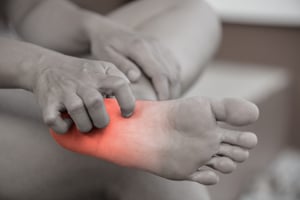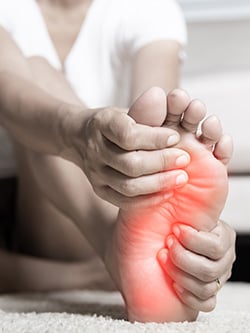Patients with Diabetes are at Risk of Developing Neuropathy
American Diabetes Month is observed each November. This month aims to educate communities about diabetes and those who are at risk of developing it. The American Diabetes Association is passionate about providing resources to educate the public about taking health into your own hands by means of good nutrition and other lifestyle changes. A shocking 34.2 million people in the US currently have been diagnosed with diabetes, and it is estimated that another 7.3 million people have diabetes that has not yet been diagnosed. Diabetes can lead to a number of secondary health conditions that affect patients throughout their entire lives.
One secondary condition that is not often mentioned when patients are diagnosed with diabetes is the risk of developing Diabetic Neuropathy.
What is neuropathy?
Neuropathy, also known as peripheral neuropathy, is a chronic condition that is caused by damage to or compression of the nerves outside the spinal cord or brain. These nerves are part of the peripheral nervous system, the system that controls movement, motor skills, and sensation. Neuropathy causes pain, tingling, weakness, and/or numbness in the affected extremity. Living with this condition may lead to discomfort and often creates a very poor quality of life for patients. Neuropathy, if left untreated, poses a high risk of recurrent wounds and infections and may eventually lead to the loss of an affected limb.
What is diabetic neuropathy?
Diabetic neuropathy is one of the most common types of neuropathy. Neuropathy occurs in nearly 50% of diabetics and is often left untreated. Over time, the nerves in diabetic patients become affected by high blood glucose levels. The excess glucose damages the walls of the small blood vessels that nurture nerves and injures the fragile coating that surrounds nerves. Symptoms of neuropathy are most common in legs and feet and can occur in either Type 1 or Type 2 diabetic patients.
How is neuropathy treated?
There are a lot of conservative treatment options that patients try for neuropathy, such as pain medication, physical therapy, or injections. However, these treatment options do not provide a long-term solution to neuropathy because they only improve symptoms but fail to treat the cause.
Our NJ reconstructive surgeons at the Institute for Advanced Reconstruction treat neuropathy with nerve decompression surgery. This procedure provides long-term pain relief by releasing the compressed nerve(s). This surgical treatment has been shown to be effective in many studies. Up to 90% of well-selected patients report improvement in the signs and symptoms of neuropathy after surgery. Most patients are able to return to their daily activities pain-free. Our surgeons are among fewer than 20 surgeons in the world that have been specifically trained in this procedure.
Request an appointment today to learn more about our neuropathy treatment options.
References:
Diabetesresearch.org
Diabetes.org






